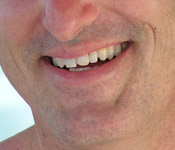 There may be something to the theory that canker sores run in the family. About 30 to 40 percent of those who experience frequent mouth sores, referred to as recurrent aphthous stomatitis (RAS) have a family history of the condition. If both parents get mouth sores regularly, you have an approximate 90% chance of getting them yourself.
There may be something to the theory that canker sores run in the family. About 30 to 40 percent of those who experience frequent mouth sores, referred to as recurrent aphthous stomatitis (RAS) have a family history of the condition. If both parents get mouth sores regularly, you have an approximate 90% chance of getting them yourself.
Unfortunately, researchers have not found out exactly why or how people inherit the tendency for outbreaks. It is possible that shared environmental factors could play a part, for instance sensitivities to particular foods or environmental allergens.
While they do not appear to be caused by bacteria or viral infections, aphthous ulcers may be caused by a problem with the immune system whereby it uses the body’s defenses against disease to attack the normal, healthy cells inside the mouth by mistake. So whenever your resistance is lowered, it could make you more susceptible to getting a mouth ulcer. While there may be a hereditary factor involved, mouth sores have multiple triggers, not limited to:
- Illness such as a cold or the flu.
- Stress – many students get mouth ulcers around exam time, for example.
- Lack of sleep – when you don’t get enough sleep, your body’s resistance gets lowered.
- Hormonal changes – some women get ulcers during certain points in their menstrual cycle while pregnancy tends to make them disappear.
- Nutritional imbalance including insufficient vitamin B12 levels or a lack of iron or folic acid.
- Minor mouth trauma such as from overly aggressive brushing, a loose orthodontic wire, accidentally biting the inside of lip, tongue or cheek
- Dental procedures such as root planing and even dental and gum cleanings.
- Exposure to extreme heat or cold.
- Gastrointestinal disease including Crohn’s disease and celiac disease, which is a gluten intolerance. Gluten is found in most grains including wheat, barley and rye.
- Food allergies or sensitivities such as eating or drinking acidic foods like tomatoes, pineapple or orange juice, or spice foods like jalapenos. Even nuts, coffee and chocolate can cause problems for some people, especially canker sores on the tongue.
- Eating foods with sharp edges such as potato or tortilla chips, crackers, or toast may cause small tears inside the mouth, making it easier for ulcers to form.
- Food allergies.
- Sodium laurel sulfate in toothpaste or mouthwash.
- A side effect of chemotherapy is the frequent appearance of mouth ulcers.
- They may be a result of Behcet’s disease, a rare inflammatory disease, and they are often seen in AIDS patients.
- Sometimes there is no apparent reason and it’s “just because.”
What Can You Do If You Get a Mouth Ulcer?
If you get them often, consider some lifestyle changes. Get more sleep, try to reduce stress, switch to a non-SLS toothpaste such as Biotene Gel Toothpaste, keep a food diary to see if you can spot a trigger food, and consider supplementing your diet with Vitamin B12 (1000 mcg)
in particular. Supplementing iron is not recommended without checking with your doctor, because too high levels can be toxic.
In the meantime, you can try one of the many topical treatments to help relieve your symptoms, including OTC medicines like Anbesol or Cankaid Oral Antiseptic Drops. Try a melt such as Cankermelts
, which is a slowly-dissolving disk that is placed over the ulcer to relieve pain and protect it from irritation. Some people swear by Milk of Magnesia: just swab a little over the sore. You can find more suggested remedies here.
When is a Canker Sore Something Else?
There are situations where what appears to be a simple canker sore may not be. There are autoimmune conditions and in rare cases, oral cancer, which may cause ulcers inside the mouth. If your mouth sore does not go away within several weeks or the pain is extremely severe and/or gets worse, you should consult your doctor to make sure you don’t have another underlying condition.


